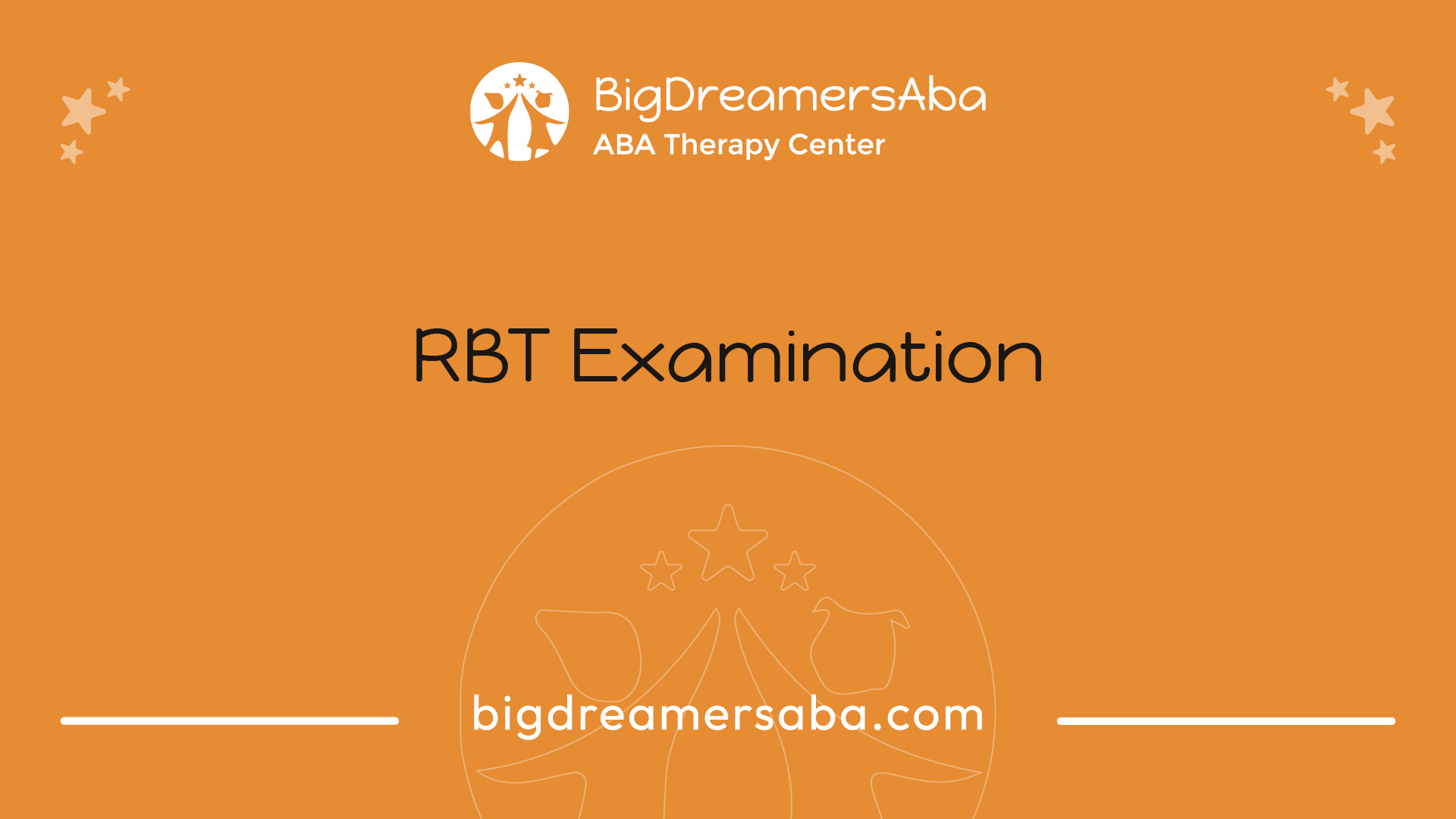How Quickly Can You Get RBT Certified?
Discover how quickly you can become RBT certified! Unveil the certification process, exam content, and career opportunities.

RBT Certification Process
Becoming a Registered Behavior Technician (RBT) involves going through a certification process that includes training and an application. Let's explore the training requirement and application process in detail.
Training Requirement
To become an RBT, individuals must complete a 40-hour training program. This training program is designed to provide the necessary knowledge and skills required to work as an RBT. The training is typically available as an online or in-person course, taking between one to two months to complete.
During the training, individuals learn about the principles of applied behavior analysis (ABA), data collection methods, behavior reduction strategies, and ethical considerations. The training is comprehensive and covers various aspects of working as an RBT.

Application Process
Once the training requirement is fulfilled, individuals can begin the application process to become an RBT. The application is submitted to the Behavior Analyst Certification Board (BACB), the organization responsible for certifying RBTs.
The application process typically takes between seven to 14 days to complete on average [1]. To complete the application, individuals need to provide necessary documentation, such as proof of age and education. There is a $50 application fee to submit the application.
After the application is reviewed and approved by the BACB, individuals become eligible to take the RBT examination.
It's important to note that the certification process and requirements may vary slightly depending on the region and specific guidelines set by the BACB.
By completing the training requirement and successfully submitting the application, individuals are one step closer to becoming certified as an RBT. The subsequent steps include taking the RBT examination, completing a competency assessment, and adhering to the renewal process to maintain the RBT certification. For more information on the RBT examination and competency assessment, continue reading the following sections.
RBT Examination
To become a Registered Behavior Technician (RBT), individuals are required to pass the RBT examination. This examination assesses the knowledge and skills necessary to effectively implement Applied Behavior Analysis (ABA) therapy under the supervision of a Board Certified Behavior Analyst (BCBA) or a Board Certified Assistant Behavior Analyst (BCaBA). Let's explore the exam content and passing criteria in more detail.
Exam Content
The RBT examination covers a range of topics relevant to ABA therapy practices. These topics include assessing clients, data collection and measurement, behavior reduction strategies, professional conduct and scope of practice, skill acquisition procedures, and reporting and documentation [1]. The exam consists of 85 multiple-choice questions, with 10 of them being unscored.

Passing Criteria
To pass the RBT examination, individuals are required to achieve a score of 80% or higher. It's important to thoroughly study and prepare for the exam to ensure a successful outcome. Many resources are available to help individuals prepare for the exam, such as study guides and practice exams. These materials can assist in familiarizing oneself with the content and format of the examination, increasing the chances of success [2].
Individuals have up to eight attempts within a 12-month exam approval period to pass the RBT examination. It's essential to carefully plan and manage the exam attempts to make the most of the allocated time frame. Remember that each attempt requires approval from the Behavior Analyst Certification Board (BACB) [3].
Preparing for the RBT examination involves diligent studying and a comprehensive understanding of ABA therapy practices. It is recommended to use study guides, practice exams, and other study materials to ensure readiness for the exam. By achieving a passing score on the RBT examination, individuals can progress further in their journey to becoming a Registered Behavior Technician and providing valuable support to individuals receiving ABA therapy.
Next, let's explore the competency assessment process, which is another important step in the RBT certification process.
Competency Assessment
As part of the Registered Behavior Technician (RBT) certification process, individuals are required to undergo a competency assessment. This assessment serves as an important evaluation of the RBT candidate's ability to effectively apply the principles and techniques of applied behavior analysis (ABA) in real-world scenarios. The competency assessment consists of two components: a time limit and a specific purpose.

Time Limit
After successfully completing the RBT exam, applicants have a maximum of 90 days to pass the competency assessment. This time limit ensures that individuals can demonstrate their proficiency in implementing behavioral intervention plans under the supervision of a Board Certified Behavior Analyst (BCBA) or a Board Certified Assistant Behavior Analyst (BCaBA).
During the competency assessment, candidates are observed while engaging in various tasks related to ABA techniques and protocols. This evaluation period allows supervisors to assess the candidate's skills and determine their competence in delivering effective behavioral interventions.
Purpose
The purpose of the competency assessment is to ensure that RBT candidates possess the necessary skills and knowledge to provide high-quality behavioral health services. By assessing their ability to implement behavior reduction and skill acquisition plans, the assessment confirms that candidates are capable of effectively supporting individuals with behavioral challenges.
The competency assessment serves as an essential step toward becoming a fully certified RBT. It allows candidates to demonstrate their practical application of ABA principles, techniques, and ethical standards. This evaluation helps maintain the integrity and professionalism of the RBT certification by ensuring that practitioners are competent and capable of providing evidence-based interventions.
It's important to note that the competency assessment is just one component of the overall RBT certification process. Candidates must also complete the required training, pass the RBT exam, and meet other eligibility requirements set by the Behavior Analyst Certification Board (BACB). To learn more about the RBT certification process, refer to our articles on how to become an RBT and is RBT certification worth it?.
Maintaining RBT certification requires individuals to renew their credentials on an annual basis. This includes completing a Renewal Competency Assessment, along with continuing education units (CEUs) and other requirements specified by the BACB. By upholding these standards, RBTs can continue providing valuable behavioral health services under the supervision of a BCBA or BCaBA.
In the next section, we will explore the renewal process and discuss the validity period of the RBT certification.
Certification Renewal
Once you have obtained your RBT certification, it's important to understand the renewal process to maintain your credentials and continue providing services as a Registered Behavior Technician. The renewal process consists of two main components: the validity period and the renewal process itself.
Validity Period
The RBT certification issued by the Behavior Analyst Certification Board (BACB) remains valid for one year. It is essential to keep track of the expiration date of your certification to ensure that you maintain your status as a Registered Behavior Technician.
Renewal Process
To renew your RBT certification, you will need to complete the renewal process before your certification expires. The renewal process involves several steps to demonstrate your continued competence in the field of applied behavior analysis.
One of the requirements for renewal is the completion of a Renewal Competency Assessment. This assessment helps to ensure that you are maintaining your knowledge and skills in providing behavioral health services. The Competency Assessment is typically completed annually and must be carried out under the supervision of a Board Certified Behavior Analyst (BCBA) or a Board Certified Assistant Behavior Analyst (BCaBA) [2].
In addition to the Competency Assessment, you may also be required to complete continuing education units (CEUs) as part of the renewal process. These CEUs provide ongoing professional development and help you stay up-to-date with the latest research and practices in the field of applied behavior analysis.
Once you have successfully completed the Competency Assessment and any required CEUs, you can proceed with the renewal application. The application process for renewal typically involves submitting the necessary documentation and fees to the BACB. It's important to allow ample time for this process to ensure that your certification remains active without any interruptions [1].
By staying proactive and completing the renewal process in a timely manner, you can maintain your RBT certification and continue providing valuable behavioral health services under the supervision of a BCBA or BCaBA.
For more information on the RBT certification process and other aspects of a career as a Registered Behavior Technician, feel free to explore our articles on how to become an RBT, is RBT certification worth it?, and can an RBT become a BCBA?.
Career Opportunities
After obtaining the Registered Behavior Technician (RBT) certification, individuals can explore various career opportunities within the field of applied behavior analysis (ABA). Two key aspects to consider when embarking on an RBT career are salary information and job growth outlook.
Salary Information
The average annual compensation for salaried RBTs in the United States is approximately $54,000, with entry-level salaries starting at around $47,000 per year. It's important to note that the earning potential of RBTs increases with experience, and some experienced RBTs can earn salaries exceeding $66,000 per year [5].
It's worth mentioning that salary ranges may vary depending on factors such as geographical location, work setting, and level of experience. Additionally, pursuing additional certifications or degrees in the field of ABA can potentially lead to higher earning potential. If you're interested in learning more about job opportunities and how to create an impressive RBT resume, you can check out our article on RBT resume.
Job Growth Outlook
The job growth outlook for RBTs is promising. Over the next 10 years, the field is projected to experience a growth rate between 12% to 22%. This growth rate is significantly higher than the average job growth rate of 5% across all occupations.
The increasing demand for RBTs is driven by the growing recognition and understanding of the effectiveness of ABA in supporting individuals with autism and other developmental disabilities. As the demand for ABA services continues to rise, so does the need for qualified RBTs. This promising job growth outlook provides individuals with a sense of stability and potential for long-term career development within the field.
It's important to stay up-to-date with the latest trends and developments in the field of ABA to enhance your job prospects. Continuous learning, staying informed about industry advancements, and pursuing further education can help RBTs excel in their careers. If you're looking for resources to prepare for interviews or seeking answers to common RBT-related questions, you can refer to our article on Registered Behavior Technician interview questions & answers.
As you embark on your journey as an RBT, keep in mind that the field of ABA offers opportunities for growth, professional development, and making a positive impact in the lives of individuals with special needs. Whether you choose to pursue higher-level certifications or explore other avenues within the field, the RBT certification serves as a valuable foundation for a fulfilling and rewarding career. To learn more about becoming an RBT, check out our comprehensive guide on how to become an RBT.
References
[1]: https://www.discoveryaba.com/aba-therapy/how-long-does-it-take-to-get-rbt-certification
[2]: https://www.mypts.com/rbt-certification-eligibility-requirements/
[3]: https://achievementstherapy.com/rbt-certification-your-step-by-step-guide/
Recent articles

How ABA Therapy Can Help Improve Focus and Attention in Children

Why ABA Therapy is the Gold Standard for Autism Treatment
